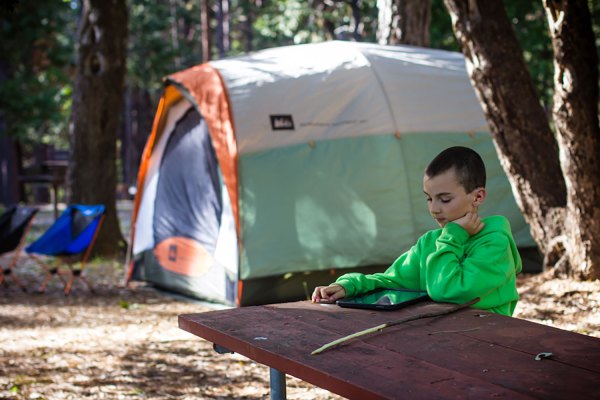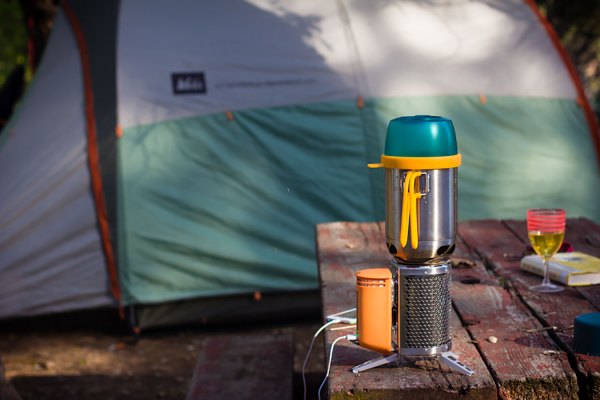I’m riding down smooth, rolling singletrack in the middle of nowhere. I can hear birds faintly chirping in the distance and wind passing through the leaves in the trees. But otherwise, I’m alone in the wilderness, blissfully mountain biking accompanied only by the sounds of nature.
Then suddenly, from ahead on the trail I catch the displaced beat of some overplayed Top 40 song, getting louder and louder. The guilty party, a mountain biker with a small speaker attached to his hydration pack, passes me without saying so much as a hello. Not that I could even hear a greeting over his blaring music anyway. After he’s around the bend and out of earshot, I build the courage to finally say to thin air, “Have you ever heard of headphones?!”
There’s a time and a place for electronic devices in the outdoors. Sometimes they can be lifesavers in critical situations, like a GPS device when you’re lost backpacking or a cellphone when you need to call for help. Other times electronics can help make an outdoor experience more pleasurable, like a camera to capture a remarkable landscape or a watch to record your speed and distance on a long run. But then there are times, like my music-booming bike ride, when electronics can put a damper on a treasured moment.

In this day and age, when people seem tethered to their devices, it’s getting more difficult for folks to leave their wired gadgets at home when they head out into the woods. According to the 2015 North American camping report, a study put out by Kampgrounds of America (KOA), 83 percent of campers say they bring their cellphone while camping and 70 percent go online at some point during their trip.
Access to free Wi-Fi at a campground is among the top three priorities for folks looking at campground amenities. Some 32 percent of people bring a GPS device camping, while 28 percent bring a laptop, and 21 percent bring a notepad or tablet. Only 10 percent of people bring no electronic devices at all.
We get outside—hiking, skiing, biking, camping and more—to get away from our worries and unplug from our normal lives. Yet we’re starting to bring our technology out there with us. So how do you know when it’s appropriate and even preferable to carry electronics and when it’s best to leave them behind? For some help on etiquette with gadgets in the outdoors, I called up Justin Nyberg, an avid runner and hiker and the founder of the gear review site GearInstitute.com.
“Purists can scoff all they want, but electronics are now a part of the modern outdoor experience,” Nyberg said. “When used in the right context, they can add to the experience of the outdoors tremendously. When used wrong, they can be a distraction from the experience and worse, they can ruin someone else’s experience.”
Nyberg’s rules of etiquette start with not letting your electronics impose on anyone else. “That means no speakers on the trail and no music at camp that can be heard from someone else’s campsite,” he says.
Music can motivate on a bike or a run, but opt for headphones so others aren’t forced to listen to your tunes. And, Nyberg adds, don’t get zoned out. “Runners and bikers with headphones are pretty common, but if you can’t hear who’s coming around the bend, or you can’t hear someone passing you, the crash will be your fault. If you know the trails will be busy, leave the earbuds at home,” he says.
As for electronic essentials, a phone (turn it off if you don’t want to deal with incoming calls from your boss) is usually a good call, since it can serve as an emergency lifeline, a camera, a flashlight, a music library, and with the right apps and maps, a decent GPS device. “A phone can also open up great opportunities to use things like stargazing apps or digital trail guides,” says Nyberg.

If you’re heading out for multiple nights, you may want a lightweight device for charging your phone. Try the BioLite Wood Burning Camp Stove, which can cook your dinner and charge your cellphone at the same time by generating electricity from the heat of burning twigs and branches.
For more ambitious trips, Nyberg adds just two more devices to his list. “If I’m really going somewhere far afield, I’ll bring a traditional GPS unit. Handheld GPSs have a distinct advantage over an iPhone as a GPS unit since their battery life is exceptionally better,” says Nyberg. “And I’ll wear an altimeter watch when I’m going somewhere where elevation matters—like mountaineering or navigating new trails by map and without a GPS.”
But laptops and tablets? If you’re trying to get away, to truly bask in the beauty of the outdoors and unplug from the wired world in which we leave, try leaving the computers and tablets at home. You can always watch movies and scan Facebook later. May we suggest bringing a book instead?
Photography by Erin Thiem/InnTown Campground.
